
TURKIYE ENTOMOLOJI DERGISI-TURKISH JOURNAL OF ENTOMOLOGY
Scope & Guideline
Unveiling the Wonders of Insect Biology
Introduction
Aims and Scopes
- Biodiversity and Taxonomy:
Research papers often focus on the identification and classification of various insect species and their ecological roles, contributing to the understanding of biodiversity in Turkey. - Insect Ecology and Behavior:
Studies explore the interactions between insects and their environments, including host plant relationships, population dynamics, and the impact of abiotic factors on insect behavior. - Pest Management and Control:
The journal frequently publishes articles on integrated pest management strategies, resistance mechanisms, and the efficacy of various biocontrol agents and insecticides. - Entomopathogenic Organisms:
Research on entomopathogenic fungi and nematodes is prominent, showcasing their potential as biological control agents in agricultural practices. - Environmental Impact Studies:
The journal includes studies assessing the effects of pesticides and other anthropogenic factors on insect populations and ecosystems. - Genetics and Molecular Biology:
There is a growing focus on molecular studies that investigate genetic diversity, resistance mechanisms, and biochemical pathways in insect populations.
Trending and Emerging
- Insecticide Resistance Mechanisms:
An increasing number of studies focus on the mechanisms of resistance in pest species, highlighting the need for sustainable pest management solutions amid rising resistance issues. - Biocontrol and Eco-friendly Pest Management:
There is a growing emphasis on research related to biocontrol agents, including entomopathogenic fungi and nematodes, as viable alternatives to chemical pesticides. - Impact of Climate Change on Insect Populations:
Emerging studies investigate how climate change affects insect distribution, behavior, and interactions with ecosystems, reflecting a broader concern for environmental sustainability. - Molecular and Genetic Studies:
Research involving genetic analysis and molecular techniques is on the rise, providing insights into the genetic diversity and evolutionary adaptations of insect populations. - Urban Entomology:
There is an increasing focus on urban ecosystems and how urbanization impacts insect diversity and pest dynamics, which is crucial for managing urban pests.
Declining or Waning
- Traditional Insect Taxonomy:
There has been a noticeable reduction in papers solely dedicated to traditional taxonomic studies, as the journal shifts more towards ecological and applied research. - Non-target Effects of Insecticides:
Although previously a significant area, the number of studies addressing the non-target effects of insecticides on beneficial species has decreased, possibly due to a growing emphasis on integrated pest management. - Morphological Studies:
Research focusing purely on morphological traits without molecular or ecological context appears to be less frequent, reflecting a trend towards more integrative approaches in entomological research. - General Faunistic Surveys:
While faunistic studies remain important, there is a decline in general surveys lacking specific ecological or conservation implications, as the journal prioritizes targeted research with clear applications.
Similar Journals
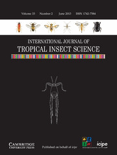
INTERNATIONAL JOURNAL OF TROPICAL INSECT SCIENCE
Advancing the Science of Tropical InsectsINTERNATIONAL JOURNAL OF TROPICAL INSECT SCIENCE, published by Springer International Publishing AG, is a leading interdisciplinary journal dedicated to advancing knowledge in the fields of insect science and ecology. With its ISSN 1742-7584 and E-ISSN 1742-7592, this journal provides a platform for researchers to publish high-quality, peer-reviewed articles that explore various aspects of tropical insect biology, behavior, and their ecological impacts. As evidenced by its Q3 ranking in both Ecology, Evolution, Behavior and Systematics and Insect Science, it plays a vital role in fostering scientific dialogue and innovation within these disciplines. Researchers affiliated with the journal benefit from its visibility and growing impact, as demonstrated by its Scopus ranks, with a percentile standing of 61st in Insect Science. Although the journal is not open access, it still reaches a wide academic audience, making significant contributions to our understanding of tropical ecosystems. Situated in Switzerland, this journal is crucial for students, professionals, and researchers invested in the intersection of entomology and ecological science.

REVISTA COLOMBIANA DE ENTOMOLOGIA
Exploring the World of EntomologyREVISTA COLOMBIANA DE ENTOMOLOGIA, published by the SOC COLOMBIANA ENTOMOLOGIA-SOCOLEN, serves as a vital platform for disseminating research in the field of insect science. With an ISSN of 0120-0488, the journal has established itself as a key resource for entomologists, agricultural scientists, and biodiversity researchers, focusing on the ecology, taxonomy, and behavior of insects within the Colombian context and beyond. Despite its Q4 ranking in 2023, REVISTA COLOMBIANA DE ENTOMOLOGIA strives to enhance its impact within the academic community, offering a space for innovative studies and reviews that aim to advance the understanding of insect-related phenomena. As a publication addressing critical concerns in agricultural and biological sciences, it invites contributions that explore new methodologies and findings relevant to the insect world. Although it does not currently offer Open Access options, the journal's growth from 2004 to 2024 reflects its commitment to evolving with the needs of its readership and contributors, making it an essential reference point for students and professionals alike interested in entomological research.

CANADIAN ENTOMOLOGIST
Illuminating the Path of Entomological DiscoveryCanadian Entomologist, published by Cambridge University Press, is a prominent journal dedicated to the field of entomology, covering key areas such as insect science, ecology, and evolutionary biology. With its origins dating back to 1868, this esteemed journal has continuously contributed to the understanding of insect behavior, systematics, and physiology, engaging researchers and professionals alike. Although currently not an Open Access journal, it offers valuable insights through its rigorously peer-reviewed articles, reflecting its commitment to scientific excellence. The journal has garnered a respectable Q3 ranking in various categories, including Ecology, Evolution, Behavior, and Systematics, making it a critical resource for scholars and students who seek to explore the complex interactions within insect populations and their environments. Researchers can trust Canadian Entomologist to provide relevant and impactful research that shapes contemporary understanding in the realm of entomological studies, fostering the growth of this vital scientific discipline.
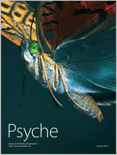
Psyche-A Journal of Entomology
Fostering Innovation in Entomology ResearchPsyche-A Journal of Entomology is a distinguished open-access journal published by Hindawi Ltd, specializing in the field of entomology, including aspects of ecology, evolution, behavior, and systematics of insects. Established in 1874, this journal has a rich history of contributing to the scientific community by disseminating high-quality research related to insects and their diverse interactions within ecosystems. With an impact factor placing it in Q3 for both Ecology, Evolution, Behavior and Systematics and Insect Science, Psyche serves as a pivotal platform for researchers, professionals, and students aiming to deepen their understanding of insect-related science. The journal's commitment to open access ensures that research is accessible to a global audience, promoting collaboration and innovation in entomological studies. Covering a broad timeline of converged years from 1874 to 2024, Psyche fosters a comprehensive dialogue around insect biodiversity, conservation, and the ever-evolving dynamics of ecosystems in which insects play crucial roles.
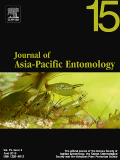
JOURNAL OF ASIA-PACIFIC ENTOMOLOGY
Fostering Insights into the World of InsectsJOURNAL OF ASIA-PACIFIC ENTOMOLOGY, published by the Korean Society of Applied Entomology, is a distinguished platform that fosters the advancement of knowledge in the field of entomology, specifically tailored to the Asia-Pacific region. Since its inception in 1998, this journal has been instrumental in providing critical insights into the diverse aspects of insect science, reflecting its commitment to supporting both research and application in a variety of contexts, including agriculture and environmental sustainability. The journal is categorized in the Q3 quartile for Insect Science according to the 2023 rankings, and it holds a respectable Scopus rank of #62 out of 181 in its niche, situating it within the top 66th percentile of its field. With a focus on peer-reviewed research that emphasizes innovation and practical applications, the journal serves as an essential resource for researchers, professionals, and students seeking to deepen their understanding of entomological studies and their implications across ecological and agricultural landscapes.
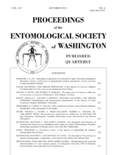
PROCEEDINGS OF THE ENTOMOLOGICAL SOCIETY OF WASHINGTON
Advancing the Frontiers of Insect ScienceProceedings of the Entomological Society of Washington is a distinguished journal dedicated to the field of entomology, published by the Entomological Society of Washington. With a rich history dating back to 1981 and a commitment to fostering scientific discourse, this journal serves as a vital platform for researchers and professionals specializing in insect science and ecology. It holds a respectable<> impact factor and is categorized in the Q3 quartile in both Ecology, Evolution, Behavior and Systematics and Insect Science, indicating its relevance within the scientific community. Although it does not offer open access, it provides a curated selection of high-quality research articles that significantly contribute to the understanding of insect biology, behavior, and taxonomy. The journal aims to bridge gaps in current research and inspire innovations in entomological studies, making it an essential resource for students, researchers, and practitioners in the field.
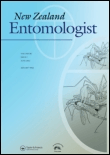
NEW ZEALAND ENTOMOLOGIST
Illuminating Insect Behavior Through Rigorous ResearchNEW ZEALAND ENTOMOLOGIST, published by Taylor & Francis Ltd, is a distinguished journal in the field of Insect Science, featuring a rich history dating back to its initial publication in 1952. As a platform for sharing innovative research and critical insights, this journal serves as a vital resource for entomologists and scientists interested in the diverse aspects of insect biology, ecology, and behavior. Although it currently holds a Q4 category in its discipline with Scopus ranking it at the 163rd out of 181 journals, the NEW ZEALAND ENTOMOLOGIST continues to uphold high-quality standards of peer-reviewed articles that contribute significantly to the understanding of insects, particularly within the unique ecosystems of New Zealand. Researchers and professionals are encouraged to submit their findings to enhance the journal's growing repository of knowledge, while students will find a wealth of information to aid their studies and foster their interest in entomological research.
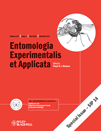
ENTOMOLOGIA EXPERIMENTALIS ET APPLICATA
Advancing insect science through innovative research.ENTOMOLOGIA EXPERIMENTALIS ET APPLICATA is a premier journal dedicated to advancing the understanding of insect science through innovative research and thorough experimental methodologies. Published by Wiley, this esteemed journal has been at the forefront of entomology since its inception in 1958, with its latest convergence extending until 2024. With a commendable Impact Factor and categorically positioned in the Q2 quartile across both Ecology, Evolution, Behavior and Systematics and Insect Science fields, it plays a pivotal role in the dissemination of critical findings. The journal is indexed in Scopus, ranking 43rd out of 181 in Insect Science, showcasing its relevance and stature within the academic community, while maintaining a robust visibility among scholars. Given its rigorous peer-review process and a commitment to quality and innovation, ENTOMOLOGIA EXPERIMENTALIS ET APPLICATA serves as a vital resource for researchers, professionals, and students aiming to deepen their insights into entomological research.
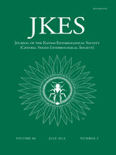
JOURNAL OF THE KANSAS ENTOMOLOGICAL SOCIETY
Shedding Light on Insects' Role in Our EcosystemJOURNAL OF THE KANSAS ENTOMOLOGICAL SOCIETY, published by the Kansas Entomological Society, serves as a vital platform dedicated to the field of entomology and insect science. With an ISSN of 0022-8567 and an E-ISSN of 1937-2353, this journal has established itself since its inception in 1994, continuing to contribute valuable research up to 2024. Despite its current Q4 categorization in the 2023 Insect Science rankings, it ranks 106 out of 181 in Scopus, representing a significant opportunity for researchers to disseminate their findings in a supportive and engaged community. Although it is not an open-access journal, its commitment to rigorous peer review and relevance in agricultural and biological sciences makes it an essential resource for professionals, scholars, and students alike. The journal's focus on local and regional entomological issues often addresses broader ecological impacts, showcasing the importance of insects in environmental health and agriculture. We invite you to explore the rich tapestry of findings and discussions within this esteemed publication.
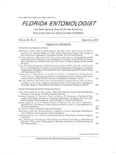
FLORIDA ENTOMOLOGIST
Pioneering Discoveries in Entomology and BeyondFLORIDA ENTOMOLOGIST is a prestigious peer-reviewed journal dedicated to the advancement of entomological sciences, published by Walter de Gruyter GmbH. Since its transition to open access in 1994, the journal has become a vital resource for researchers, students, and professionals in the fields of Insect Science and Ecology, Evolution, Behavior, and Systematics. With an impact factor ranking high in its category—Q2 in Insect Science and Q3 in Ecology, Evolution, Behavior and Systematics—the journal showcases significant findings and contributions that shape our understanding of insect biology and its implications for ecological systems. The journal is indexed in Scopus, further establishing its relevance, with current rankings reflecting its competitive standing within Agricultural and Biological Sciences. Published continuously since 1982, FLORIDA ENTOMOLOGIST not only facilitates the dissemination of knowledge among entomologists but also encourages interdisciplinary collaboration, making it an essential publication for anyone invested in the scientific study of insects.